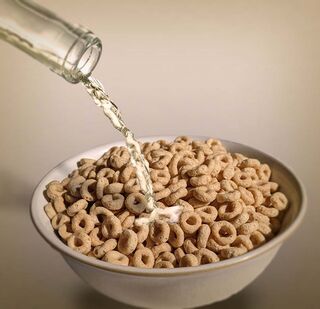Coronavirus Disease 2019
Coronavirus Drives Us to Drink and Our Microbes Are Enablers
Can a healthier gut microbiota help us to drink less?
Posted August 13, 2020 Reviewed by Kaja Perina
COVID-19 is making happy hour come earlier for many who are sheltering in place. But should we really be starting our day with Chardonnay over our Cheerios?

Insidiously, the coronavirus may have enablers: your gut microbes. You have a unique set of microbes in your gut, called the microbiota, that talks to your brain—and your brain talks back. The conversation is not overly chatty, and mostly you’re unaware of it, but your microbes may be soft-talking you into bad behavior.
They have more control than you might suspect. If they are balanced, life is good. But if your microbes are disturbed, they can make you miserable. If you’ve ever had food poisoning, you’ve experienced an extreme example of this phenomenon.
Psychobiotics and mood
Much of what we know about the gut-brain axis comes from the labs of John Cryan and Ted Dinan, two prolific researchers at University College Cork in Ireland. They coined the term “psychobiotics” to refer to microbes that can improve your mood. They also suspect that gut microbes are behind many of our cravings.
Surprisingly, bacteria can produce neurotransmitters, the chemicals that allow your brain cells to talk to each other. Some of them, like serotonin and dopamine, are associated with pleasure, and bacteria may use them to drive your behavior, although the details are still being worked out.
You likely don’t remember making a conscious choice to crave donuts, and that may be because you didn’t: your microbes did. Of course, donuts are finely crafted to appeal to your taste buds, and they give you a sugar buzz, which really seals the deal. But your gut microbes may also play a role in tipping you toward pastry instead of say, kale.
Amazingly, there’s accumulating evidence that your gut microbes may be encouraging you to drink as well. The first hints of this came with bariatric surgery. It can be quite successful for weight loss, but for some it comes with a weird side-effect: a change in cravings. Complete teetotalers have been known to become alcohol enthusiasts. The reason isn’t clear, but researchers know that bariatric surgery significantly changes the gut microbiota.
Can microbes reduce alcoholism?
A new study from researchers at Virginia Commonwealth University adds to the notion that some microbes may be booze-hounds. After the researchers changed the microbiota of alcoholics, 90% of them had reduced cravings for alcohol (versus 30% for placebo).
How did they change those microbes? This should perhaps come with a trigger warning: they used a fecal transplant. In this procedure, the researchers first blast the existing microbiota with antibiotics. Then they choose a healthy donor to provide some fecal matter, which is carefully screened for disease. Hopefully the donor is happy and has a belly full of psychobiotics, because this kind of happiness is literally contagious. That donation goes right where you think it does, becoming the patient’s brand-new microbiota. Researchers call it repoopulation. Treat it right and your new microbiota can last for years, maybe for life.
How microbes rule
How do microbes affect your cravings? Think of it as microbial momentum. If you have microbes that desire sugar and you deny them their treats, they can produce chemicals to make you feel anxious. When you cave to their demands and go for the chocolate bar, they can produce chemicals like dopamine to make you happy.
But something more happens when they get what they want: they multiply. And that means that their candy con has a larger effect, making you more likely to respond. These greedy microbes gain momentum, pushing out other species. Before you know it, you're a chocoholic.
Something similar seems to be happening with alcohol cravings, although the mechanism is likely to be different. Alcohol can kill bacteria, so the momentum may go to the bacteria that are most resistant to booze.
Successful natural systems, humans and microbiotas alike, manage to stay stable over time. They resist environmental changes, constantly working to keep things in balance. This is the principle of homeostasis. But if you persist in feeding pathogens, microbial momentum can override homeostasis and keep your gut permanently off-balance. Many people are living like that. It leads to inflammation, making them overweight and sick.
The momentum makes it difficult to break the cycle. That’s why fecal transplants are a such a breakthrough. But with a little will-power, you can force your microbiota into a new state—without the ick factor.
How to fix your microbiota
First, stop doing the wrong things. That will starve the bacteria that are craving unhealthy items.
Second, start doing the right things. That will cause a bloom of healthy bacteria, including those that heal the gut, tamp down inflammation, and improve mood.
The list of wrong things is long but includes such normal aspects of modern life as too much stress, too much fast food, too many sweets, staying up late, excess drinking, cigarette smoking, and couch surfing.
The list of right things is shorter: eat more fiber, get some sleep and exercise. It is actually simpler to be healthy than to be sick, but the transition can be tricky. Try it anyway. Your microbes will moan and groan and try their best to get you to accommodate them. Ignore the diminutive tyrants. They do not have your best interests at heart. If they accidentally kill you, they will gladly consume you. They are not your friends.
You want the true-blue bacteria; the ones that work with you as nature intended. Our evolutionary partnership with microbes goes way back, long before KFC and Krispy Kremes. There were no doughnuts rolling across the savanna in our ancient African birthplace. Back then, fast food was a gazelle. Which, by the way, reinforces the admonition to exercise.
Once you’ve established a better microbiota, your desire to misbehave will be greatly diminished. Even with a more conservative microbiota, sugar highs and alcohol buzzes are fun for your brain, so you still need a little self-control. But a healthy microbiota makes it easier.
You will never completely lose your original microbiota—unless you get a transplant. But once established, a healthy microbiota will have its own momentum, in tune with homeostasis. This harmony comes with a bonus: a strong microbiota is the best defense against pathogens, even coronavirus. And that’s a good reason to skip the wine in your cereal.
References
Dinan, Timothy G., Catherine Stanton, and John F. Cryan. “Psychobiotics: A Novel Class of Psychotropic.” Biological Psychiatry 74, no. 10 (November 15, 2013): 720–26.
Bajaj, Jasmohan S., Edith A. Gavis, Andrew Fagan, James B. Wade, Leroy R. Thacker, Michael Fuchs, Samarth Patel, et al. “A Randomized Clinical Trial of Fecal Microbiota Transplant for Alcohol Use Disorder.” Hepatology n/a, no. n/a. Accessed August 12, 2020.




